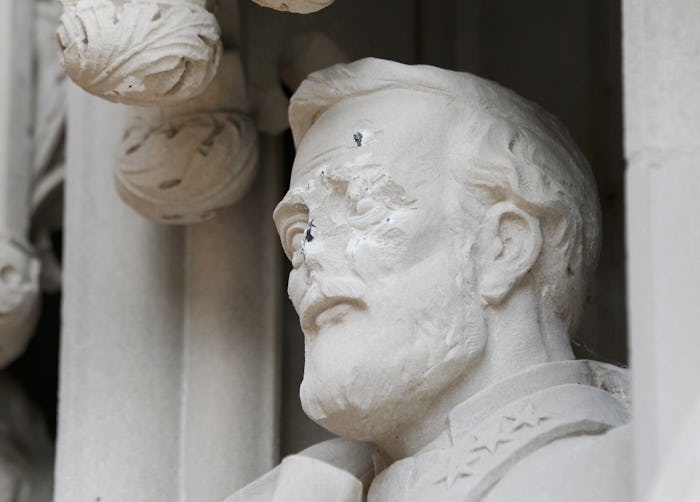News

Why Keeping Confederate Monuments Is Like Having Statues Of Hitler
Somehow, in 2017, the United States is deeply embroiled in a debate over what to do with the shrines to white supremacy that speckle its public spaces. These vestiges of the Civil War, which mostly tower over residents of southern states, have long memorialized key Confederate figures who fought a war against the United States to defend the institution of slavery. And those on the side of removing them from places like parks argue that their presence is akin to honoring a history as shameful as the Holocaust. In fact, keeping Confederate monuments is like having statues of Adolf Hitler, the German leader who, you might have heard, led the Nazi party in systematically murdering millions of Jewish people during World War II.
It seems absurd that this is even a topic of conversation more than 150 years after the end of the Civil War. How could a civilized society tolerate the public veneration of the likes of General Robert E. Lee, the traitorous Confederate white supremacist whose statue protesters in Charlottesville, Virginia, rallied to protect earlier this month? In Germany, any comparable public tribute to Hitler or any of the others who helped carry out the atrocities of the mid-20th Century would never, ever be tolerated — because the display of Nazi imagery there is, rightly, illegal.
Those desperate to maintain the status quo when it comes to the statues argue that their removal from public spaces is essentially an erasure of history. Not so. No one is arguing that we as a nation should forget about slavery (or that that's even really possible), or that the southern states once launched a war lasting four years to defend the barbaric practice. Rather, it's inappropriate to use statues to glorify the enslavement and oppression of African American people — a scar on our collective history that has very real and lasting effects to this day.
In Germany, on the other hand, you'll have to head to a museum decrying the abomination that was the Holocaust in order to see any Nazi paraphernalia. And Germans certainly have not forgotten their history. Not only is it mandatory for students to learn about the horrors the Nazis inflicted there, but the country as a whole did a much better job educating its people about that history than the United States ever has in accurately representing the real story of the Civil War and why it was fought.
As Joshua Zeitz wrote for Politico, Confederate organizations post-war worked hard to sanitize the Confederacy's goals after it lost. Instead of confronting the fact that the South had engaged in the war to defend the "right" to keep other people as property, the Confederacy "de-emphasized the ideological origins of the war and instead promoted a powerful but vague cult of Southern chivalry, battlefield valor and regional pride."
These campaigns were largely successful, resulting, for example, in generations of schoolchildren learning to call the war "the War Between the States." In this way, Confederates sought to elevate their cause in retrospect, to put it on par with the Union's. That's why people often talk about their "southern values" with pride, despite the fact that all of that "pride" is directly tied to their ancestors' racism.
A totally different scenario played out in Germany after World War II. Former Nazis were identified and persecuted. Vestiges of their cause were aggressively purged from public life. "Political reeducation" efforts — such as making Germans view footage of the liberation of concentration camps — emerged, Zeitz wrote. In short, Germany as a whole did not cower from its past, but it still took a lot of hard work and time to get where the country is today.
Here in the United States, many Americans have yet to do that work. The fact is that Nazis and the Confederacy have a lot in common. They both inflicted extreme violence and cruelty on huge numbers of people whom they considered "less than," as well as fought a bloody war against the United States. So, despite President Donald Trump's dogged defense of the Confederate monuments, local governments should take Germany's lead and remove those celebrations of hate and tools of intimidation.
In Germany, a monument to Hitler would be considered an endorsement of the horrors he inflicted on so many millions of people. To call slavery a "horror" is a massive understatement, so endorsements of that have no place in the United States.